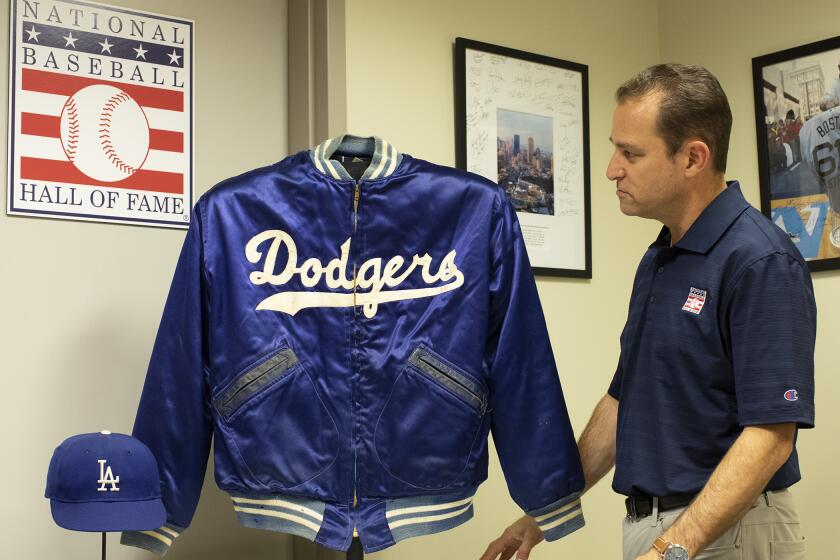Life and Basketball in Shades of Brown
- Share via
Dale Brown is alive and well. There’s a story in that. There’s also a story in his noise. He’s still making it. And a lovely noise it is.
“All I ever did was suggest that the NCAA system needed to be changed to accommodate human dignity,” he says now, 20 summers after first saying it, seven years after retiring as Louisiana State University’s basketball coach.
Brown’s suggestions were made with persistence, purpose and passion.
They were made by an eccentric thinker whose stream-of-consciousness oratory was done so skillfully that he could tie Jesus Christ, Jiminy Cricket, Jimmy Carter, Adolf Hitler, Adolph Rupp and Gustavus Adolphus into a logical sequence without so much as a pause to consider the improbability of such juxtapositions.
“I wanted to end the NCAA’s monumental hypocrisy,” Brown says of the intercollegiate athletics system against which he railed.
In one more proof that no good deed goes unpunished, Brown soon saw NCAA bloodhounds padding around the LSU campus, noses to the ground.
Brown says, “They reacted by trying to prove I was Elmer Gantry,” novelist Sinclair Lewis’s archetype religious hypocrite.
Here’s how hypocritical Dale Brown was. An LSU player was dying of cancer in St. Louis. Three teammates wanted to visit him. If Brown paid for that trip, an NCAA official told him, he would violate NCAA rules governing “off-campus entertainment.”
Let’s see. Cancer. Entertainment. Yeah, same thing.
How stupid is that?
So Brown took the three players into his office, pulled the blinds and gave each an envelope containing $300. “Geez,” he told a magazine writer, making public the violation, daring the NCAA to make a case, “I felt like I was being filmed. But I gave them the money, and I’d do it again.”
He’d do it because he knows what it’s like to have no money. He was born poor. His father left three days later. He grew up over a tavern in North Dakota. Sports got him out. A basketball, football and track star at Minot State, a high school coach for 13 years, he became LSU’s head coach in 1972. In 25 seasons, his Tigers won four Southeastern Conference regular-season championships and twice reached the NCAA Final Four.
He was always making noise about NCAA rules that he believed treated athletes as property instead of people. If a player needed glasses to read, the school couldn’t buy them; if the player needed contact lenses for basketball, the school could buy those.
Let’s see. To study, no. To make money, yes.
How stupid is that?
“Just because it’s a rule doesn’t mean it’s right,” Brown once told me. “It was a rule that Montgomery blacks sat at the back of the bus until Rosa Parks changed it. Somebody has to change the rules in college athletics.”
Now 68 years old, Brown does corporate speaking, directs the Dale Brown Foundation, which funds scholarships for needy students, and pays attention. So I spoke to him again because some NCAA rules changes have been made and made on an emergency legislation basis.
The rules are designed to slow down if not stop the carousel of luxury spinning so merrily in the recruiting of college athletes. No more private planes, five-star restaurants, gourmet meals. No more red-carpet treatment on Tours Over America with the recruits’ names in scoreboard lights and on jerseys.
Such is this mad world we’ve created that the NCAA has ordered each school to write rules against sexual favors, drugs, alcohol, gambling and strippers.
Here’s what Dale Brown thinks: “It’s really progress.”
But when I asked whether he thought the changes would make much difference, he said, “How thick is the NCAA rulebook, 450 pages? You could type up on a 3-by-5 index card the Ten Commandments, and all of us struggle to keep those. How’s anybody going to live by 450 pages of rules?”
Now, seven years out of coaching, Brown says, “One of the great reliefs I have is not fooling around with the NCAA.”
There’s also the matter of being alive. As he stepped into a pair of slacks on April 24, 2003, Brown collapsed in pain. He rose with difficulty; he had no strength in his left hand. His wife said, “What happened to you? You’re slurring your words.”
A blood clot had closed a carotid artery, cutting off blood to the brain and producing a stroke. Brown says he lay in an emergency room and heard a vascular surgeon say the artery was 100 percent closed. “I can’t do anything,” the surgeon said, “I’m afraid I’ll lose him on the table.”
But after three days in intensive care, Brown says, his cardiologist reported the newest results of sonogram tests on the carotid.
“He said, ‘Coach, I can’t explain it. I’ve never seen it before, but your blood clot has disappeared. You’re cleaned out.’
“It was nothing but a miracle. I’d had a massive stroke, and I walked out of the hospital unscathed.”
Now, some people will insist that massive strokes leave irreparable injuries to the brain. Those people are free to go argue with Dale Brown, who says, “I know what I believe happened, and that’s what’s important.”
A stroke. A miracle.
Very smart.
More to Read
Go beyond the scoreboard
Get the latest on L.A.'s teams in the daily Sports Report newsletter.
You may occasionally receive promotional content from the Los Angeles Times.










